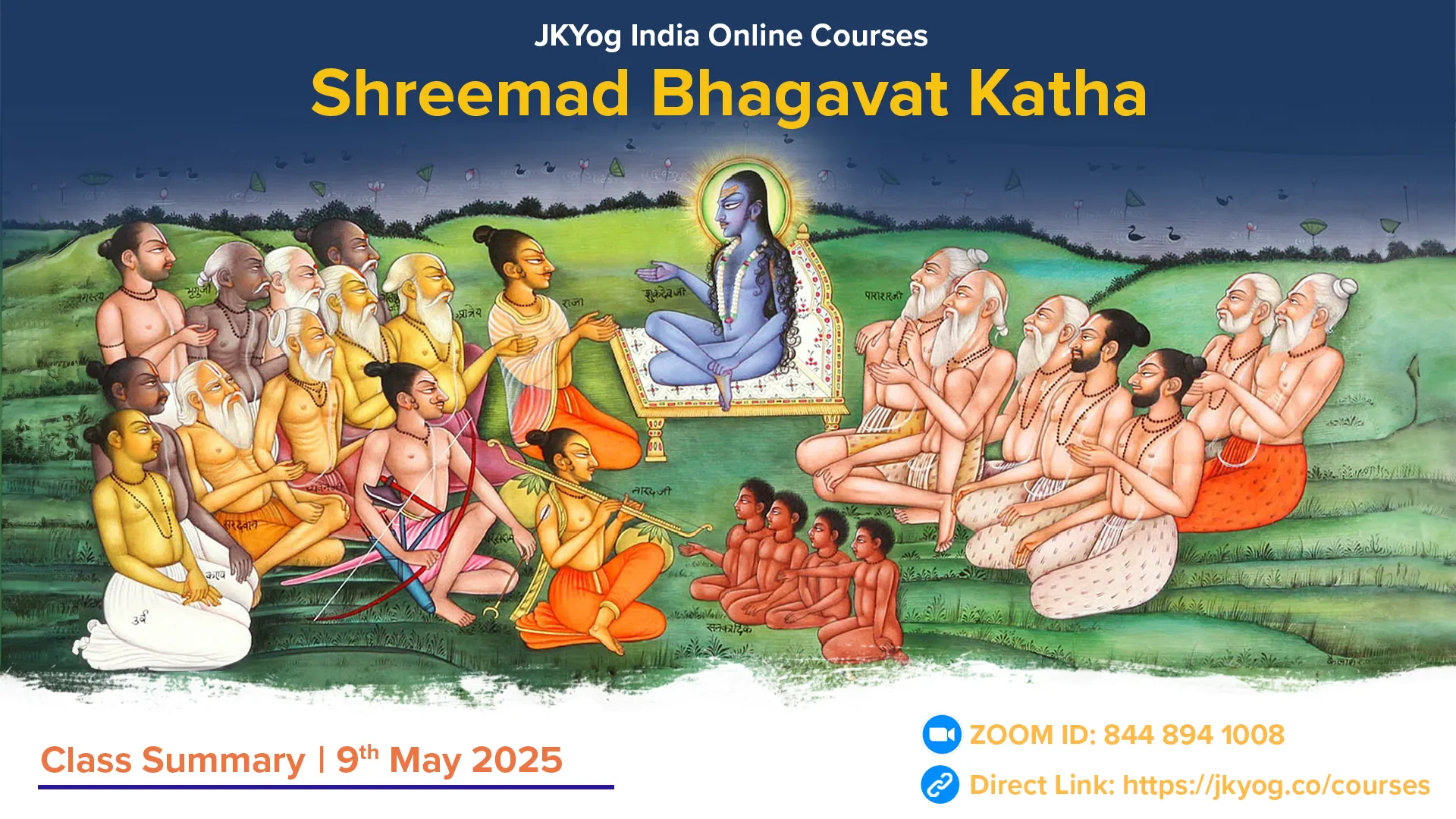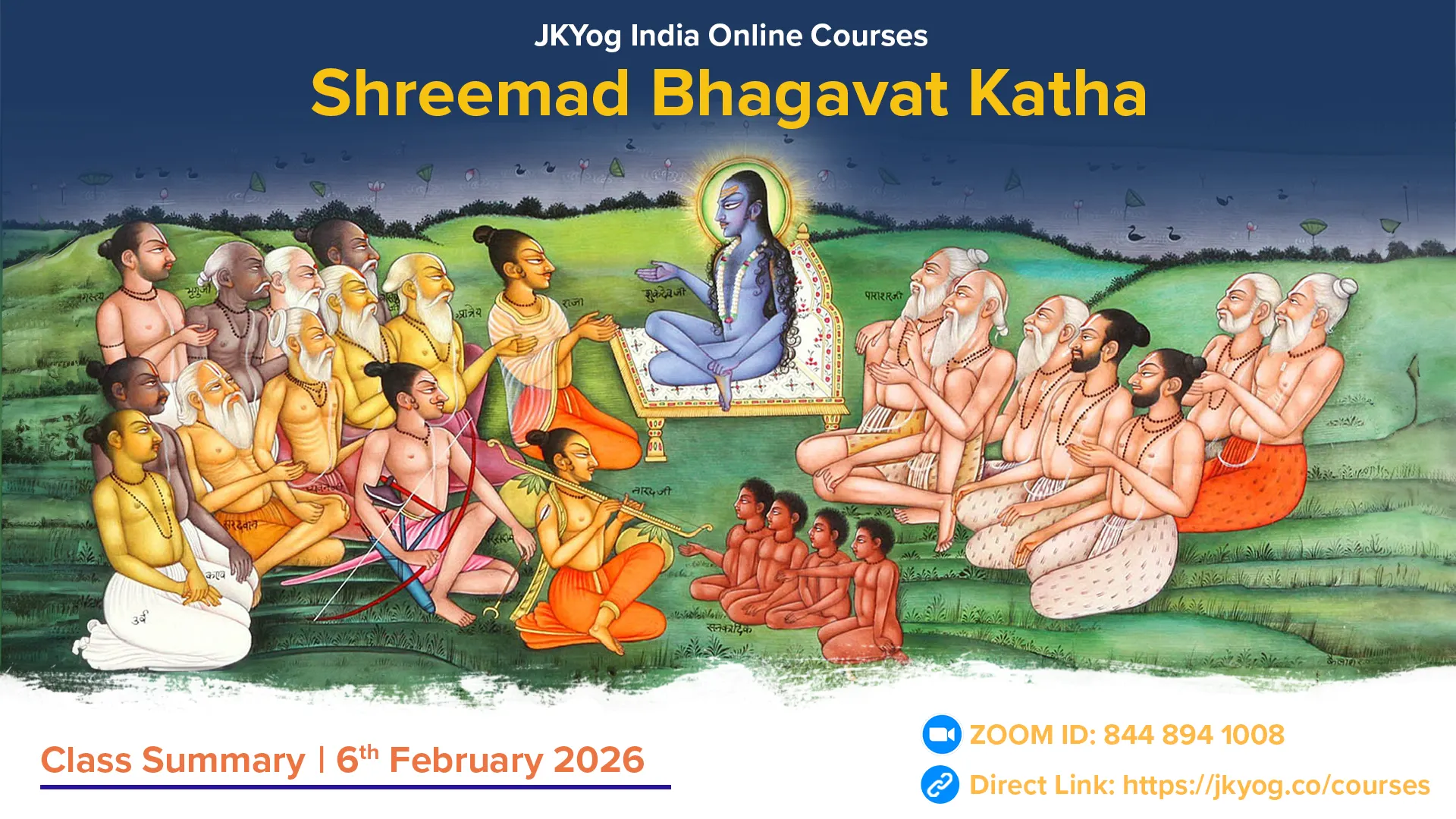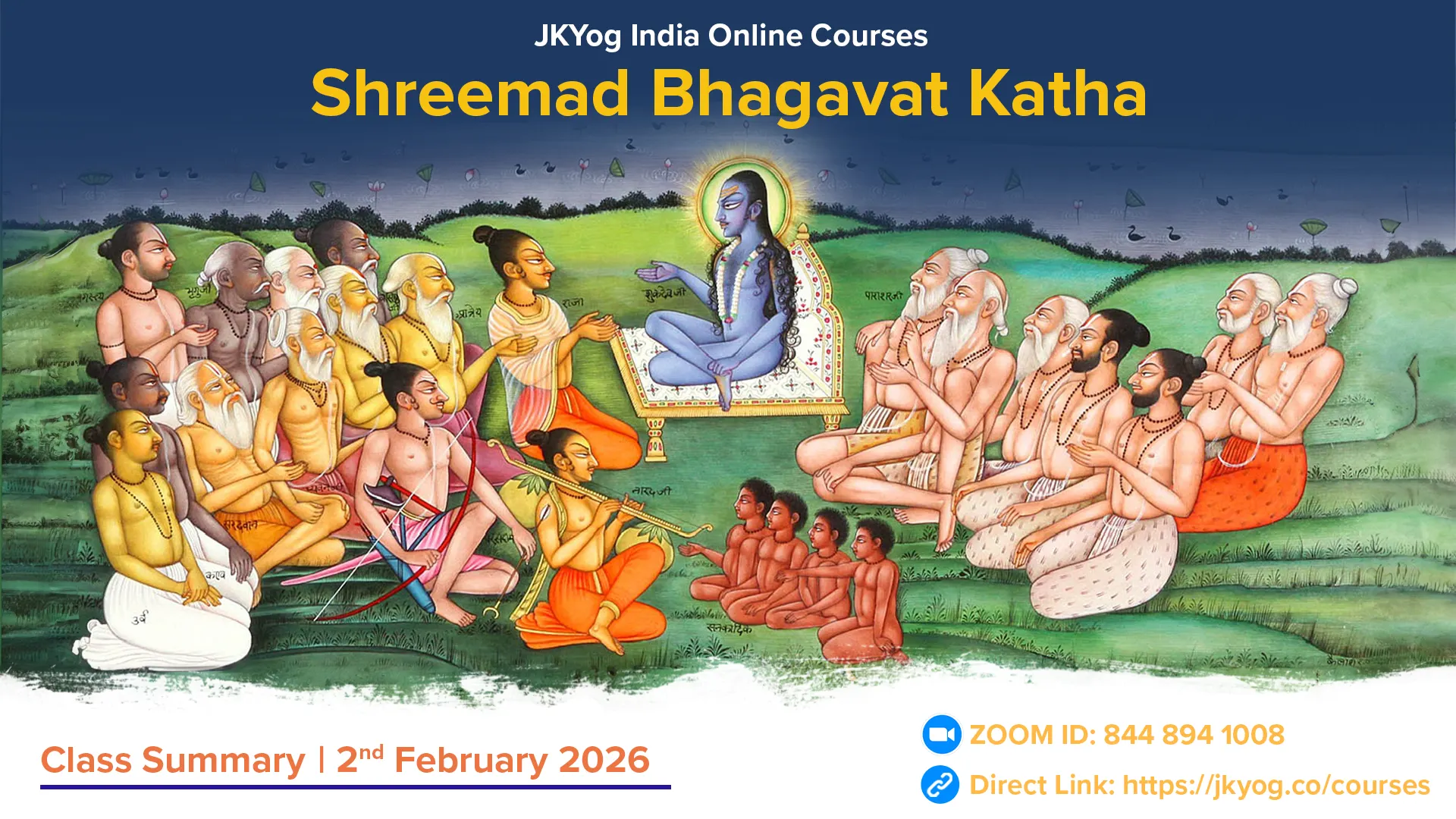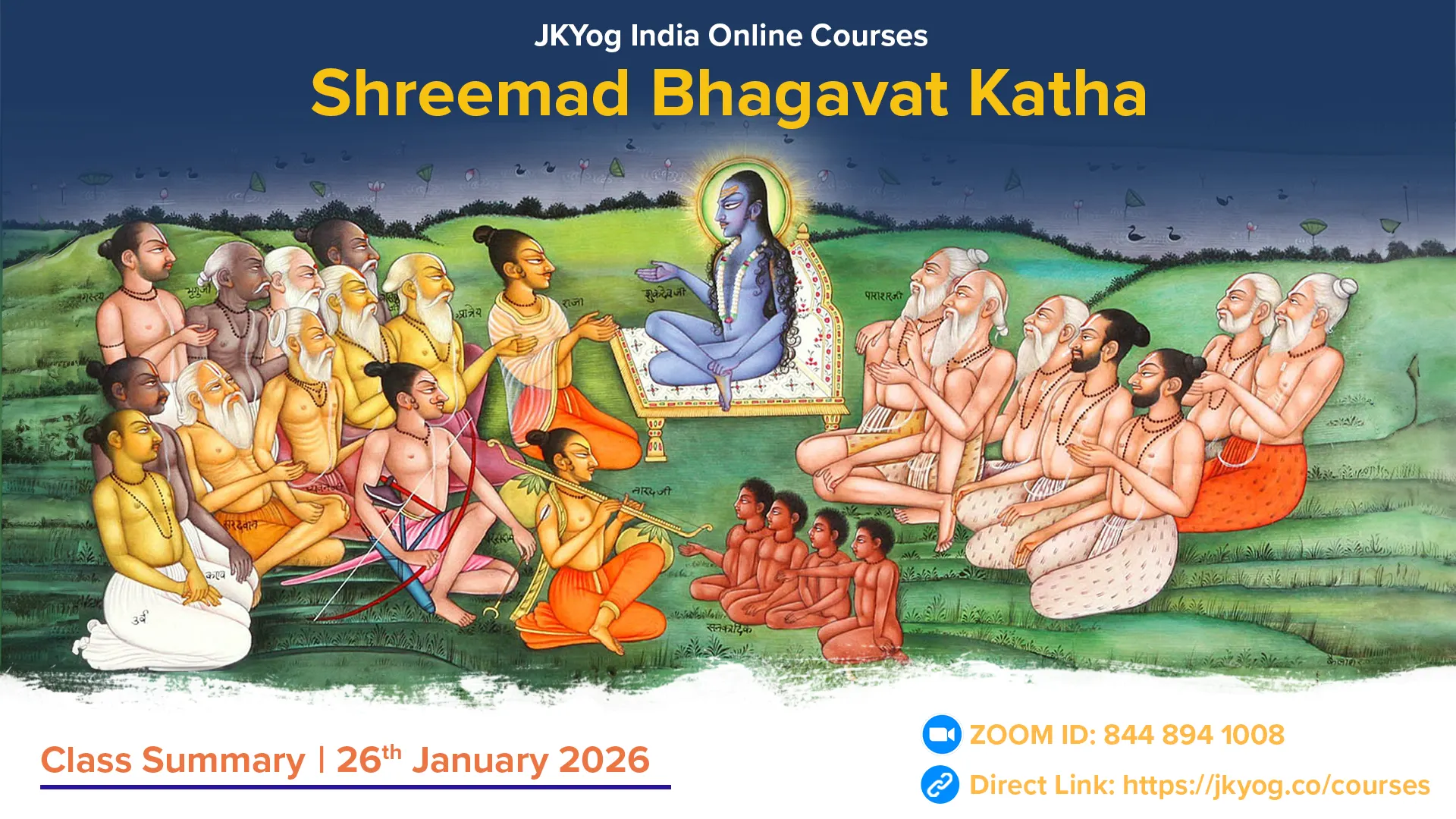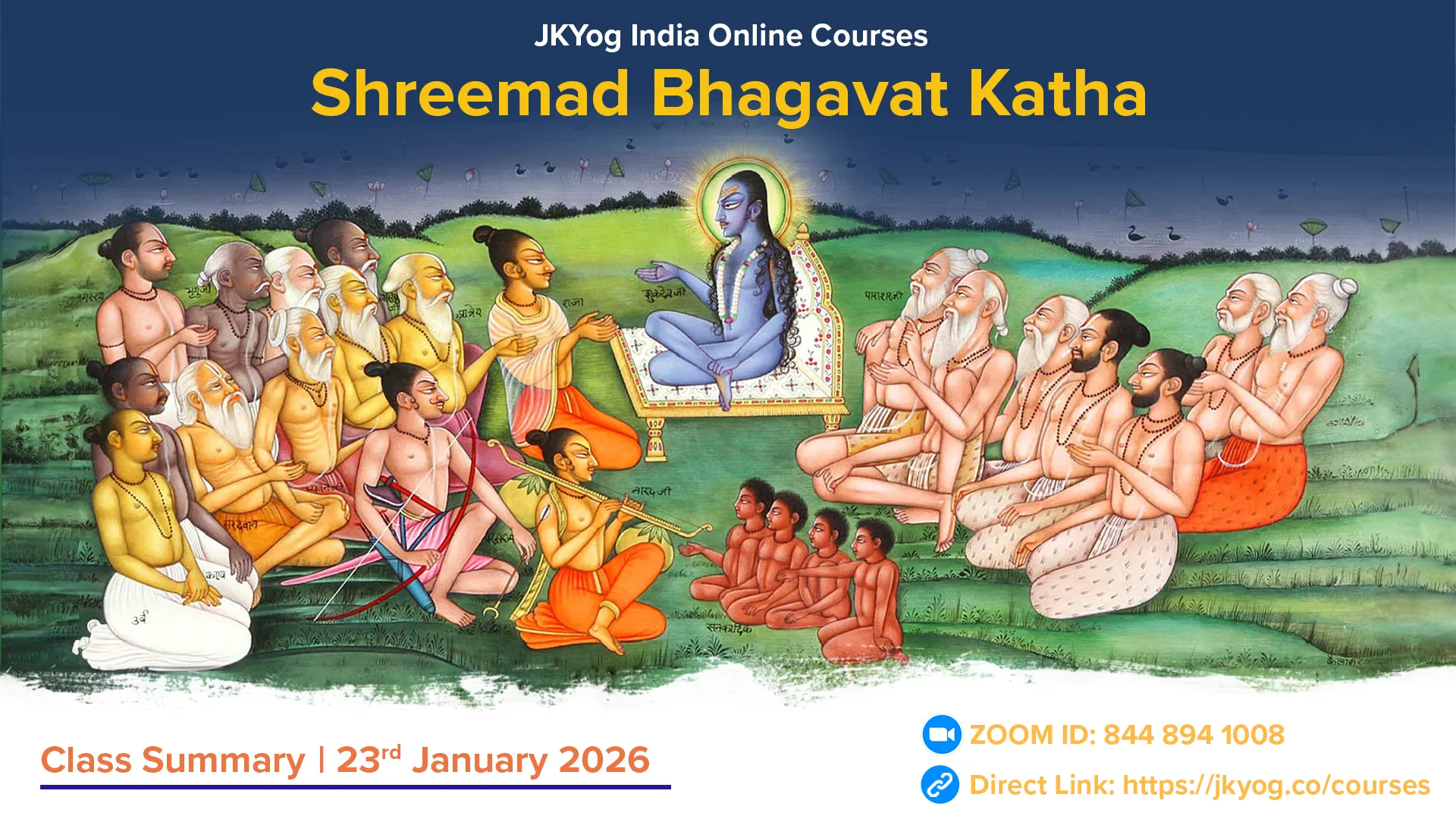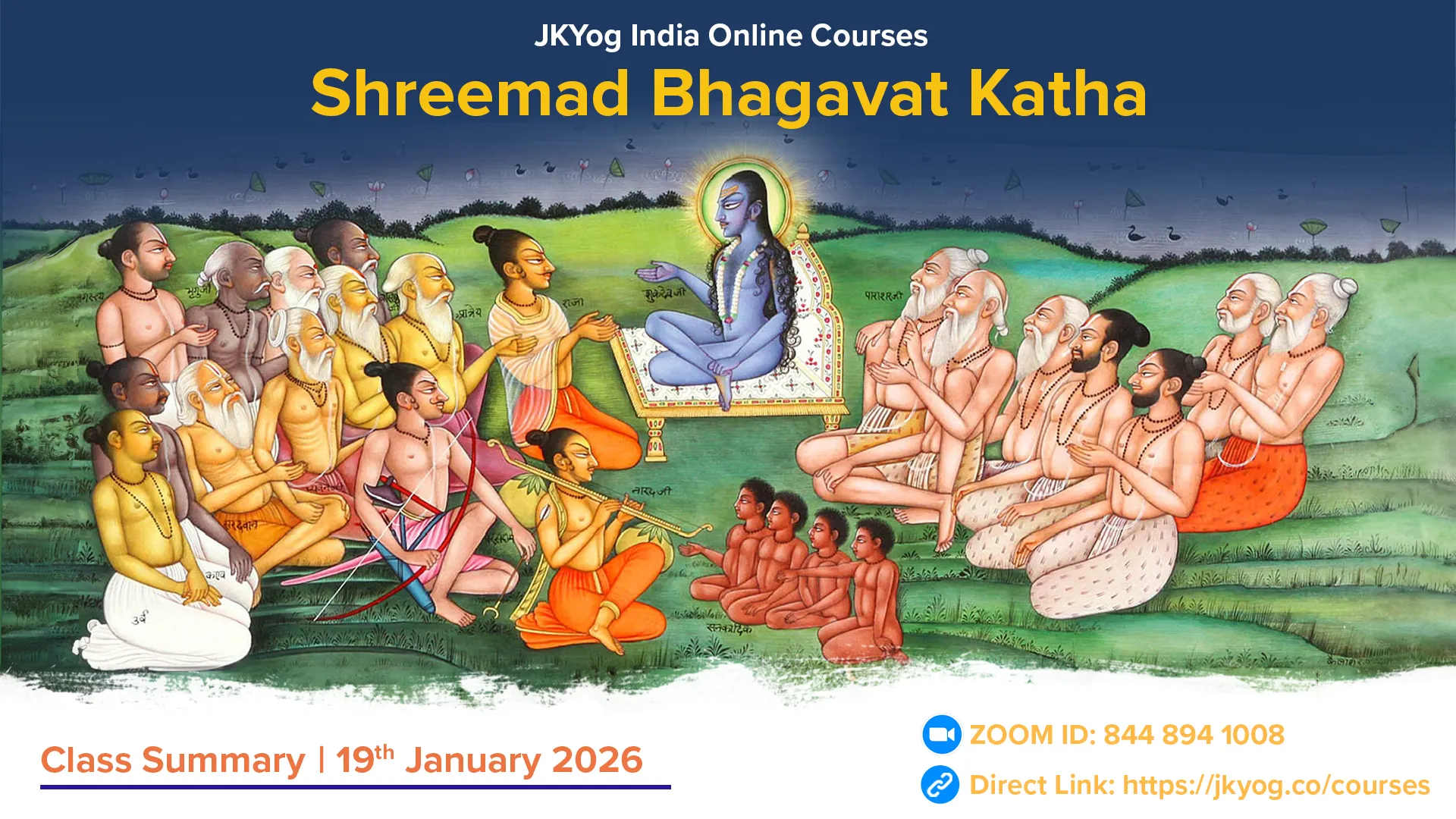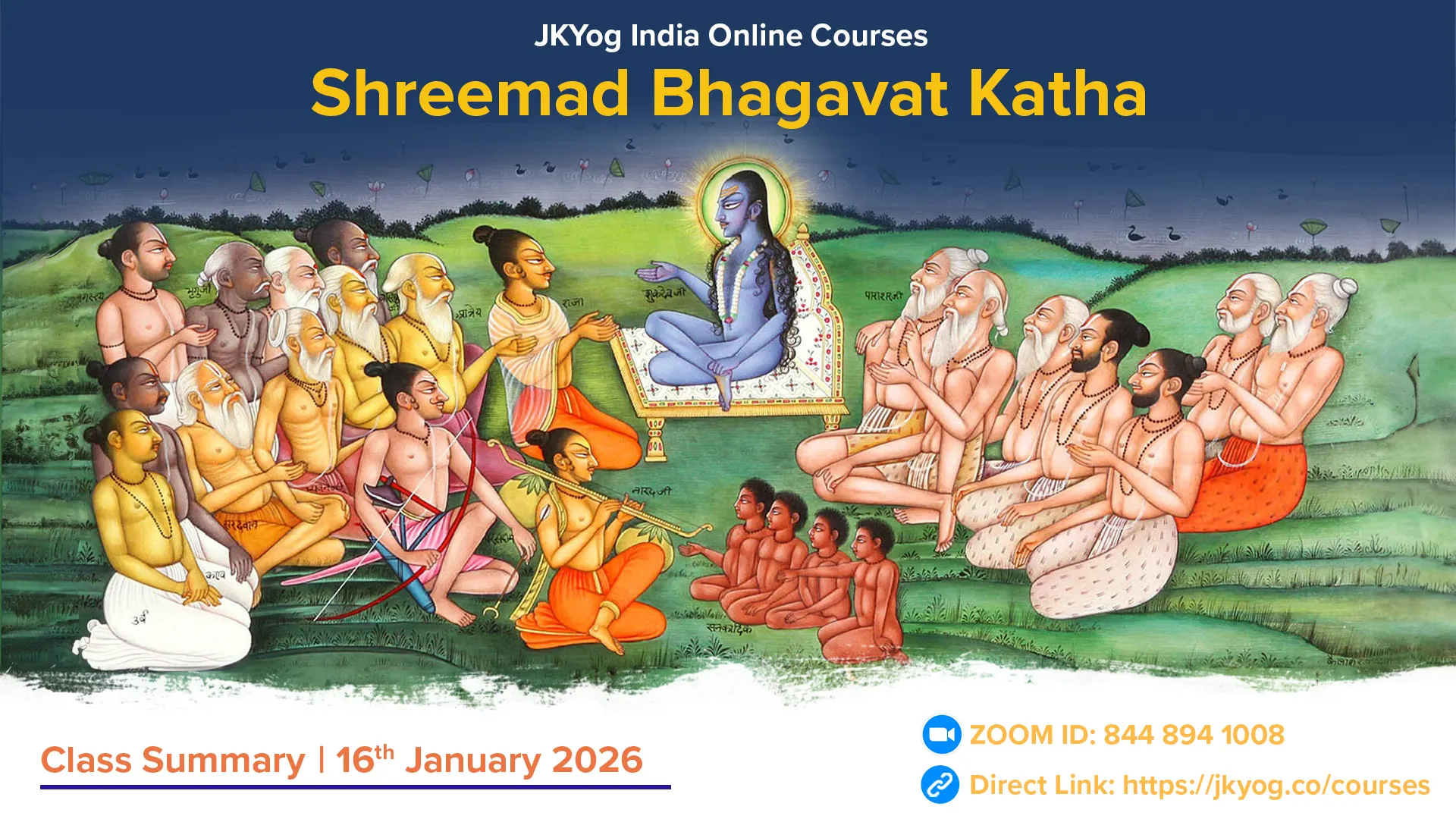Shreemad Bhagavat Mahapuran- Canto: 7, Chapters: 5-7
When Prahlad spoke of the ninefold path of devotion (Navadha Bhakti) to Shree Hari, Hiranyakashipu was consumed with rage. In a fit of fury, he hurled Prahlad from his lap onto the ground. His eyes blazed red with anger as he thundered at his demon soldiers, "Kill him!"
At his command, the fierce rakshasas, armed with tridents, launched a brutal assault on Prahlad, striking at his vital points. Yet Prahlad remained unmoved—his heart absorbed in unwavering devotion to the Supreme Being. Such was the power of his Bhakti that all their attempts failed, just as the efforts of the unfortunate are always in vain.
Stunned by this miracle, Hiranyakashipu grew desperate. He devised countless terrifying ways to end the boy’s life—crushing him beneath elephants, throwing him into dens of venomous serpents, unleashing the ferocious demoness Kritya, hurling him from mountaintops, launching illusionary assaults, poisoning him, starving him, casting him into blazing fire, turbulent waters, raging storms, blizzards, and even burying him under mountains. But not a single method could harm Prahlad. His devotion to Shree Hari made him untouchable—an embodiment of divine protection and fearless faith.
In the end, Hiranyakashipu, now filled with utter despair, found himself at a loss. He had insulted Prahlad in every conceivable way and unleashed countless methods to end the boy’s life, yet Prahlad not only survived but remained fearless, even continuing to stay near him. This bewildering resilience began to gnaw at Hiranyakashipu’s mind. He began to suspect that Prahlad was no ordinary child—he seemed to fear nothing, was impervious to harm, and exhibited an otherworldly strength. It dawned upon the king that perhaps, one day, this child could be the very cause of his downfall. The thought struck him like a shadow of doom, and his face grew pale with the weight of it.
Seeing their king in such a state, Shanda and Amarka, the sons of Shukracharya, approached him privately. "O King," they said, "You are the conqueror of the three worlds. Why do you worry over this mere child? Until our father, Shukracharya, returns, bind him and keep him under control. With time and proper education, his intelligence can be redirected."
Hiranyakashipu, desperate for a solution, accepted their counsel and sent Prahlad back to school. There, Prahlad was taught the three pursuits of Dharma (righteousness), Artha (prosperity), and Kama (pleasure). Though Prahlad learned with utmost humility, he found no satisfaction in the lessons, for they catered to those who were bound by worldly attachments and desires, a life far removed from his devotion to the Supreme.
Why Prahlad says devotion to Shree Hari must begin from childhood
One day, when the teacher had gone out for some work, the young boys invited Prahlad to play during their break. Prahlad knew that their minds were still pure and full of natural reverence. So, instead of playing, they all sat around him with devotion and listened to his teachings. Seeing their sincerity, Prahlad's heart filled with compassion and affection, and he began to teach them about devotion to God.
Kaumaar aacharet praajno dharmaan bhaagavataan iha
Durlabham maanusham janma tadapy adhruvam arthadam
Prahlad said, "Dear friends! Human birth in this world is extremely rare. Through it, one can attain the eternal Supreme Soul. But we never know when it might end. Therefore, a wise person should not wait for youth or old age but should begin practising the means to attain God right from childhood." (Bhagavat 7.6.1)
Yathaa hi purushasya iha Vishnoh paadopasarpanam
Yadesh sarva bhootaanam priya aatma Ishwarah suhrit
"In this human life, taking shelter at the feet of Shree Vishnu is the only true success because He is the dearest well-wisher, inner soul, and master of all beings." (Bhagavat 7.6.2)
Prahlad explained that pleasure and pain come by destiny (prarabdha), so working only for sensory pleasures is futile. Those who remain trapped in these enjoyments cannot realise Bhagwan. Since life is unpredictable, one must strive for self-realisation while the body is still healthy. Those who fail to control their senses waste half their life just sleeping.
Mughdhasya baalye kaumare kreedato yaati vimshatih
Jarayaa grasat dehasya yaaty akalpasya vimshatih
"In childhood, a person lacks wisdom of what's good or bad. In adolescence, they waste time in play. Thus, twenty years pass unknowingly. Then old age sets in and consumes the body, and the last twenty years pass without the strength to do anything meaningful." (Bhagavat 7.6.7)
Duraapoorena kaamena mohena cha baleeyasa
Shesham griheshu saktasya pramattasya apayati hi
"In the little time that remains in between, there are endless desires, overpowering delusion, and deep attachment to home and family. Caught in this web, the soul loses awareness of duty or wisdom. Thus, even the remaining years slip away." (Bhagavat 7.6.8)
Prahlad said, “O young daitya friends! Anyone who considers sensual pleasure to be the highest goal in life gets trapped in the web of desires. Entangled in worldly attachments, they may even commit sins. Their lives pass in anxiety over family and wealth, and they never chant Bhagwan's name. Such people attain a dark and unfortunate destiny. One who is bound by attachment to wife and children cannot uplift their own soul. So, abandon the company of such pleasure-seeking people and surrender to Bhagwan Narayan. Those who give up worldly attachments find that Bhagwan becomes their one true love and supreme goal. To please Him, you don't need to make huge efforts—because He is already present in every being as the indwelling soul.”
Paraavareshu bhooteshu
Brahmaanta sthavaraadishu
Bhautikeshu vikaareshu
Bhooteshv atha mahatsu cha
Guneshhu gunasaamye cha
Gunavyatikare tathaa
Eka eva paro hyaatmaa
Bhagavaan eeshvaro avyayah
From Brahma to the tiniest grass, from moving to non-moving beings, in all five elements, in their modifications, in the subtle principles and even in the three gunas—the same eternal Supreme Soul exists. He alone is the controller, the most beautiful, most blissful, and the treasure-house of all divine wealth. (Bhagavat 7.6.20-21)
Pratyag aatma swaroopena
Drishya roopena cha svayam
Vyaapya vyaapak nirdeshyo hi
Anirdeshyo avikalpitah
He is the seer and also the seen. Though beyond all definition and duality, He is described both as all-pervading and all-contained. In truth, there is not even the slightest duality in Him. (Bhagavat 7.6.22)
Kevala anubhava ananda
Swaroopah Parameshwarah
Maayaya antarhit aishwarya
Eeyate guna sargayaa
He is pure experience, pure bliss, the one Supreme Lord.
His divine glories appear hidden only due to maya, which creates the world from the three gunas. The moment Maya clears, Bhagwan becomes visible to the heart. (Bhagavat 7.6.23)
Prahlad said, “Therefore, my friends give up the daitya nature and demoniac tendencies. Have compassion for all living beings. Work lovingly for their well-being—that is what pleases Bhagwan the most. When Bhagwan is pleased, Dharma (righteousness), Artha (wealth), Kaam (desires), and Moksha (liberation)—everything follows naturally. Even the knowledge of Vedas and scriptures is useless if it doesn't support devotion to Bhagwan. This rare Bhagavat knowledge is revealed only to those who become sanctified by the dust of devotees' feet. That is the only true, pure knowledge that I heard from Naradji himself.”
Prahlad Received the Knowledge of Bhagavat Dharma in the Womb
Hearing this, Prahlad's classmates were astonished and asked, "But Prahlad, apart from the two sons of Shukracharya, we haven't heard of any other teacher—and neither have you!
You are still very young and have lived within the palace all your life with your mother. So, when and how did you meet Naradji?"
Prahlad narrated, "When my father went to Mandarachal for penance, the devatas attacked the daityas. In fear, the daityas fled, and Indra captured my mother, Kayadhu. Naradji intervened, rescued her, and revealed that she was carrying a divine soul—a devotee of Bhagwan—whom no one could harm. At Naradji's request, Indra respectfully released my mother, and she stayed at his ashram.
There, with devotion, she served Naradji, and I received the knowledge of Bhagavat Dharma while still in her womb. By his grace, that knowledge remains alive within me even today.
If you have faith, this divine knowledge can also awaken in you."
The six fundamental changes of the body
Janmaadyah shadime bhaavaa
Drishtaa dehasya na aatmanah
Phalaanaam iva vrikshasya
Kaalena Ishwara-moortinaa
The six states of existence, namely birth, sustenance, growth, change, decay, and destruction, are seen in the body, not in the soul. Just as the fruits on a tree grow, stay, ripen, wither, and finally perish according to time and the will of God. (Bhagavat 7.7.18)
Twelve Divine Qualities of the Soul
Aatma nityo avyayah shuddhah
Ekah kshetrajna aashrayah
Avikriyah swadrik hetur
Vyaapakah asangi anaavritah
The soul is eternal, imperishable, pure, one, the knower of the field, the abode of all, unchanging, the cause of all actions, all-pervading, free from attachment, and without covering. (Bhagavat 7.7.19)
One who truly knows the soul as such gives up the false ego of 'I' and 'mine', which is born out of ignorance related to the body. Just like a goldsmith separates gold from ore, the wise seeker, through inner sadhana, discovers Bhagwan (Brahman) in his very own being.
Definition of the Body
Ashtau prakritayah proktaah
Traya eva hi tadgunah
Vikaaraah shodasha aacharyaih
Pumaan ekah samanvayaat
The body is composed of:
- 8 principles: Prakriti (nature), Mahat-tattva (great principle), Ahankar (ego), and 5 Tanmatras (subtle elements)
- 3 gunas: sattva, rajas, tamas
- 16 transformations: five sense organs, five action organs, mind, and five gross elements (earth, water, fire, air, space)
Among all these, the individual soul (purusha) is the one conscious principle. (Bhagavat 7.7.22)
Dehas tu sarva-sanghaato
Jagat-sthasthur iti dvidhaa
Atraiva mrigyah purusho
Neti neti iti atat tyajan
The body is the aggregation of all elements in the world, and it is of two kinds — stationary and moving. One must seek the true self here itself, and in doing so, renounce the idea that it is not this (the body), not this (the mind), thus rejecting the false identification. (Bhagavat 7.7.23)
The soul is present in all beings, but it is distinct from all. One should gradually contemplate the creation, maintenance, and dissolution of the world with a pure and detached mind, without haste. The waking, dreaming, and deep sleep states are all of the intellect, and the soul, the witness of all, is the supreme consciousness. The soul is separate from the body and primordial nature (prakriti), yet due to ignorance, it remains trapped in the cycle of birth and death.
What is the supreme means to attain liberation from the cycle of birth and death?
To be free from it, one must destroy the root of all karmas — the gunas (modes of nature) and vasanas (deep desires). This alone is Yog, the true union with the Supreme. Many paths exist, but the highest path is to connect with Bhagwan through selfless love (nishkaam prem).
Guru shushrooshaya bhaktya sarva labdha arpanena cha
Sangena saadhu bhaktaanaam Ishwar aaradhanena cha
Shraddhaya tat-kathayaam cha keertanaih guna karmanaam
Tat paadaamburuha dhyanaat tat lingeksha arhanadibhih
By lovingly serving the Guru, offering everything one receives to Bhagwan, keeping the company of saintly devotees, worshipping the Supreme, listening to His stories with faith, singing His glories and deeds, meditating on His lotus feet, and seeing and honouring His divine forms — by these means, pure love for Bhagwan naturally arises. (Bhagavat 7.7.30-31)
Harih sarveshu bhooteshu Bhagwan aasti Ishwarah
Iti bhootani manasa kaamaih taih saadhu maanayet
Recognise that the all-powerful Bhagwan Hari resides in all living beings. With that feeling, fulfil their wishes as much as you can and honour them with a pure heart. (Bhagavat 7.7.32)
Evam nirjita shad vargaih kriyate bhaktir Ishware
Vasudeve Bhagavati yaya samlabhyate ratih
Those who conquer the six enemies — lust, anger, greed, delusion, pride, and envy — and practise this form of devoted bhakti to Bhagwan Vasudev (Krishna), attain deep and exclusive love for His lotus feet. (Bhagavat 7.7.33)
When a devotee listens to the pastimes, qualities, and character of Bhagwan with deep joy — their body thrills, eyes overflow with tears, and they begin dancing, singing, or crying out His name — this is the effect of bhakti-yog. Such a devotee becomes fully immersed in Bhagwan. All their karmic chains break, the heart becomes God-filled, the cycle of birth and death ends, and they attain Him eternally.
The Only True Purpose of Human Life – Devotion to Shree Krishna
Prahlad further told his friends that for the soul stuck in the mud of this world, attaining Bhagwan is the only real liberation. The wise call it “Brahma-realisation”; others call it “Nirvana”. But Bhagwan already resides in everyone’s heart — singing His glories requires no special effort. He is like our soul, our dearest friend. Then, isn’t it foolish to chase after fleeting worldly pleasures instead of Him?
We run after wealth, women, children, palaces, elephants, and treasures — but all of it is perishable, and the one chasing it is also perishable. Even the fruits of heaven and Vedic sacrifices are temporary. That’s why the scriptures call them flawed. Only Bhagwan is perfect, faultless, and eternal. People, considering themselves intelligent, keep doing karmas (actions) to gain pleasure and avoid sorrow. But what they get in return is more sorrow. The more desires grow, the more the earlier happiness turns into frustration. We struggle endlessly for this body, but eventually, it perishes and becomes food for dogs and jackals. So what to say of the things connected to it — children, spouse, wealth, houses, servants — all are equally temporary. These sense objects appear meaningful on the surface, but in truth, they lead to ruin.
The soul is itself a fountain of infinite bliss — it has no true need for these trivial, fleeting things. Just reflect: a soul that remains bound to karma from birth to death, constantly caught in suffering — what real good can such a being find in this world? Identifying with the subtle body — the mind, intellect, and senses — the soul acts under delusion. These actions (karmas) give rise to a new body, and a new body leads to further karmas. Thus, the endless cycle of karma and rebirth continues, all rooted in ignorance — the absence of true knowledge. There is only one way to break this cycle: to sing the glories of Shree Hari with pure, selfless love. Even Dharma, Artha and Kaam lie under Bhagwan’s control — none of them can be attained without His grace. Shree Hari is the Paramatma — the Supersoul within all — the true Ishwar, and the most intimate beloved of every living being. Whether one is a deva, asura, or human — anyone who takes refuge in Him through devotion becomes eligible for the highest welfare.
Na alam dvijatvam devatvam rishitvam va asuraatmajaah
Preenanaya Mukundasya na vrittam na bahu jnata
Na daanam na tapo na ijya na shaucham na vrataani cha
Preeyate amalayaa bhaktya Harir anyad vidambanam
O son of an asura! To please Bhagwan Mukund, it is not enough to be a Brahmin, deva, or rishi; nor to have good conduct or vast knowledge. Not even donations, austerities, sacrifices, outer purity, or following many rituals are enough. Bhagwan is only pleased by pure, selfless devotion. Everything else is mere show. (Bhagavat 7.7.51-52)
That is why, O children of the Daityas! Consider all beings as your own and engage in devotion to the Supreme, the all-pervading, all-powerful soul of all. Even daityas, yakshas, rakshasas, and countless sinful beings have attained divine love for Bhagwan through the power of bhakti.
Etaavaan eva loke asmin pumsah svaarthah parah smritah
Ekaanta bhaktir Govinde yat sarvatra tad eekshanam
In this world, the only true self-interest — the highest goal of human life — is to attain exclusive, one-pointed devotion to Bhagwan Shree Krishna. And the true form of such devotion is to see Him in everything, everywhere, at all times. (Bhagavat 7.7.55)
Summary: JKYog India Online Class- Shreemad Bhagavat Katha [Hindi]- 09.05.2025

